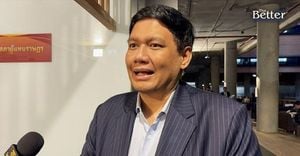On April 22, 2025, Emirates Integrated Telecommunications (DU) announced a significant partnership with Microsoft (MS) to establish a large-scale data center in the United Arab Emirates (UAE). The contract, valued at 20 billion dirhams (approximately 5.45 billion dollars), positions Microsoft as the main tenant, focusing on data storage and cloud computing services. This agreement was signed during Dubai AI Week, marking a pivotal moment in the UAE's strategic vision to enhance its digital ecosystem.
DU's CEO emphasized the importance of this collaboration, stating, "This is a critical change in achieving our strategic goal of revolutionizing the digital ecosystem in the UAE." Currently, DU operates five data centers across the UAE, which is aggressively investing to become a major hub for artificial intelligence (AI) technology.
Meanwhile, the broader landscape for data center investments appears to be shifting. Amazon is set to announce its financial results on May 1, 2025, with a keen focus on trends in AI demand. However, the company has recently paused negotiations for some colocation-type data center contracts in Europe, a move that follows Microsoft's decision to withdraw from a $10 billion data center project in Ohio. This project had included substantial tax incentives but faced local concerns about job creation and the high consumption of water and electricity.
Microsoft's CEO, Satya Nadella, has expressed skepticism about the immediate economic benefits of AI, stating, "AI has not yet brought substantial benefits to the American economy." Despite this, Microsoft plans to invest $800 billion in infrastructure over the next few years, indicating a long-term commitment to AI and related technologies.
The cancellation of the Ohio project has raised mixed reactions among local residents. While some view the halt as beneficial due to the potential reduction in tax burdens, others lament the loss of job opportunities that such projects typically bring. The construction of data centers often involves a significant workforce, and the cessation of these plans could mean fewer jobs in the region.
Moreover, the investment in aging infrastructure and renewable energy that could have accompanied these projects is now uncertain. Some community members had high hopes that AI would bring tangible benefits to their daily lives, and the sudden shift in investment plans has left many feeling disappointed.
As the AI landscape evolves, other companies like Meta and xAI are continuing to ramp up their data center construction efforts to bolster their AI models. However, these large-scale facilities require substantial amounts of electricity, and there are growing concerns that current power grids may not be able to support this increased demand. Reports indicate that Amazon already operates facilities with a combined power capacity of 9 gigawatts, highlighting the scale of energy required for these operations.
The economic backdrop is also concerning, with fears of a recession casting a shadow over the AI boom. Amazon's stock has dropped 24% this year, and with over 70% of products sold on its marketplace sourced from China, the ongoing trade tensions and tariffs imposed during the Trump administration are likely impacting its bottom line.
Analysts suggest that the current economic uncertainty is prompting companies to reassess their data center strategies. Wells Fargo and TD Cowen have reported that Amazon's decision to pause negotiations mirrors Microsoft's recent actions, indicating a broader trend among tech giants to reconsider their investments in this sector.
Despite the challenges, the demand for AI infrastructure remains, albeit with a more cautious approach. Companies are grappling with how to effectively leverage AI for efficiency and cost savings, and the recent news of project halts may further complicate these efforts.
As the situation develops, stakeholders will be closely monitoring the implications of these shifts. The intertwining of economic pressures, local community impacts, and the evolving landscape of AI technology will undoubtedly shape the future of data center investments.
In conclusion, while the partnership between DU and Microsoft marks a significant step forward for the UAE's ambitions in the AI sector, the broader market dynamics reveal a complex interplay of opportunities and challenges that companies must navigate. The future of AI infrastructure investment is uncertain, and how these companies respond to economic pressures will determine their paths forward in this rapidly changing environment.






